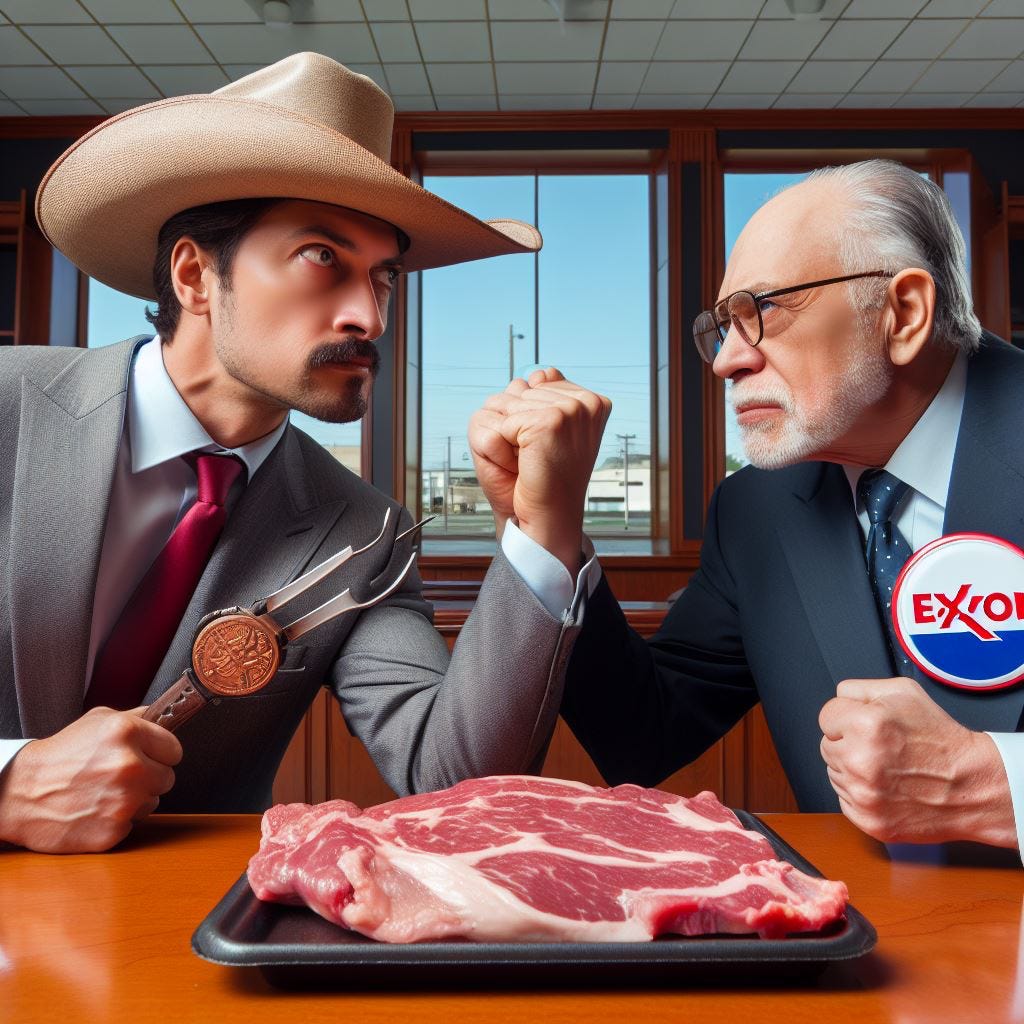“Meat and dairy should be suing oil and gas”
Instead of copying Big Oil's climate playbook, the animal agriculture industry should be seeking damages for it, a researcher argues.

Big Meat is looking more like Big Oil every day. A new study published in the journal Climatic Change finds that, much like fossil fuel industry, the animal agriculture industry has been creating and funding academic research institutions that claim the world doesn’t need to consume less of their products; that it’s not necessary to preserve a safe and livable climate.
That is, to be clear, not what non-industry funded research says. The Intergovernmental Panel on Climate Change—whose findings are compiled by hundreds of climate scientists and signed off on by 195 countries—has warned that the industry-preferred strategy of “technical fixes only” is not moving fast enough to prevent climate catastrophe. “Despite significant technical potential” for reductions in animal agriculture emissions, the IPCC says, “there is evidence that little progress has been made in the implementation of mitigation measures at the global scale.” This is extremely important, because even if fossil fuels were eliminated immediately, emissions from agriculture would still push global warming past safe levels. And meat and dairy make up most of agriculture emissions.
This is why an increasing number of scientists and activists say it’s now necessary for wealthy nations to reduce their meat and dairy consumption. In fact, even the IPCC wanted to say that in its most recent report—but the animal agriculture industry successfully lobbied for the language to be scrubbed.
It’s perhaps understandable that Big Meat would choose the route of scientific obfuscation from a business perspective. That’s what the fossil fuel industry did for decades after all, and it was able to continue to grow and profit despite the scientific community’s recommendations.
But Jennifer Jacquet, a professor of environmental science and policy at the University of Miami and a co-author of the recent study, thinks there’s a more lucrative and creative option for the animal agriculture industry: litigation. Because if it weren’t for the fossil fuel industry’s delay tactics, it’s possible we wouldn’t even be talking about our diets in the first place.
”Meat and dairy should be suing oil and gas,” Jacquet said in an interview. “Because part of the reason that we're in this position is because we did nothing about oil and gas.”
Jacquet is the author of two books: “The Playbook”, which covers how corporations lie about climate change, and “Is Shame Necessary?” about how to use shame to force corporations to change their environmental policies. In our interview, we discussed how to think about animal agriculture relative to fossil fuels; the eerie similarities between the two industries; and her novel idea to pit them against one another in court.
A BRIEF INTERRUPTION: Hi everyone! Emily here. Before we get to the *meat* of today’s letter (heyo!), I wanted to tell you about a fascinating and important new podcast by my friend and fellow independent climate journalist Jordan Gass-Pooré.
Hazard NYC is a four-part limited series that explores how climate change is affecting the city's myriad toxic Superfund sites. Follow Jordan and Samantha Maldonado, a senior reporter at THE CITY, on a tour of New York City's dirtiest places and what's at stake with the cleanups—before it's too late. You can find the episodes here, or by searching “Hazard NYC” on your favorite podcast app.
This interview has been edited, condensed, and rearranged for clarity.
Arielle Samuelson: A lot of people still aren’t convinced that animal agriculture is a climate problem worth focusing on, in part because fossil fuels and carbon dioxide are our largest climate problem. What’s the one thing you really want to get across to people about animal agriculture and its place in the fight against climate change?



